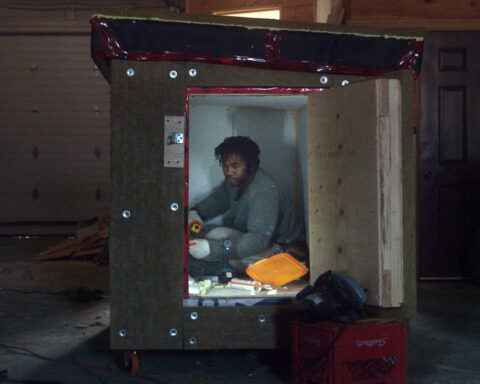Ibrahim: A Fate to Define
(Denmark/Lebanon/Qatar/Slovenia/Palestine, 110 min.)
Dir. Lina Al-Abed
Programme: TIFF Docs (World Premiere)
We’ve seen films like Ibrahim: A Fate to Define before, the ones where family members find out much—sometimes too much—about their missing relatives. It’s a great doc genre, incorporating thriller and mystery elements while allowing for deeper dives into questions of character and identity. Often they’re first features, since siblings, parents and cousins are far more likely to give you intimate access into their thoughts and lives than people you’ve just met.
It’s a pleasure to see a new doc director create an intelligent, emotional film in this increasingly well-trod form. Kudos to Lina Al-Abed who has made a quiet, moving documentary depicting how her family changed after her beloved father Ibrahim departed, never to be seen again, in 1987. Existentialism is an overused term but it fits the bill when considering Ibrahim, the quintessential quiet “ordinary” man, a Palestinian living with his family In Damascus, who led a secret life as a revolutionary. What was his true identity? His daughter wants to know and so will the viewers of this film.
Lina Al-Abed already knew that her father was also known as Rashid, a member of the violent Palestinian group Abu Nidal (aka the Revolutionary Council), which opposed Yasser Arafat’s PLO (Palestine Liberation Organization) after it attempted to broker peace and cooperation with Israel. The Abu Nidal group attacked the west and Israel ferociously in the late ‘80s, killing over 1600 people in 20 countries. Lina Al-Abed tries to reconcile her memories of Ibrahim when she was a young girl—her father disappeared when she was six—with the image of an Abu Nidal revolutionary.
She discovers that Ibrahim was quite secretive, refusing to talk about anything political with the many women in his family and regularly instructing friends to walk in front of or in back of him, to avoid a potential assassination attempt. Eventually, she finds out that he may have been involved in financial improprieties with a Swiss bank, which may have contributed to his disappearance. Al-Abed also becomes aware that a distant relative—still living—may have betrayed him to radicals in Abu Nidal, who may have executed him.
While Lina Al-Abed does her job as a detective and researcher, the most interesting parts of the film are the personal ones. She spends time with her mother, and an older sister and brother. Each has a story to share with her about their relationship and impressions of Ibrahim. As the film unfolds, we see that their contact with Lina, the youngest, has become stronger. They acknowledge her development as an adult, who has to come to terms with a father that is far more of a legend to her than to them.
Quietly, too, this film is a meditation on being Palestinian. How does it feel to be born Palestinian but spend your life elsewhere—in Damascus, Jordan, and even Germany in the case of her brother? The Al-Abed family has become alienated from their own land and even from the diverse revolutionary groups, who have worked so hard to create a new Palestine. How do they feel? Most importantly, how does the filmmaker feel? The final irony of Lina Al-Abed’s film is that Ibrahim’s radical activities may have made Palestine more remote than it might have been had he stayed alive and been that quiet man they thought he was.











